Mastering Blackjack: Strategies and Insights for Players
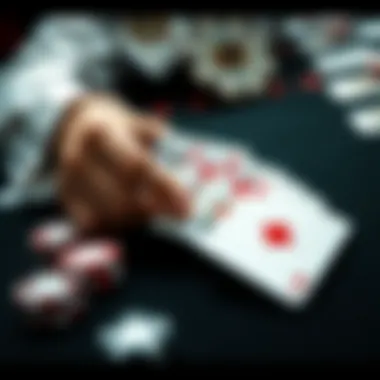
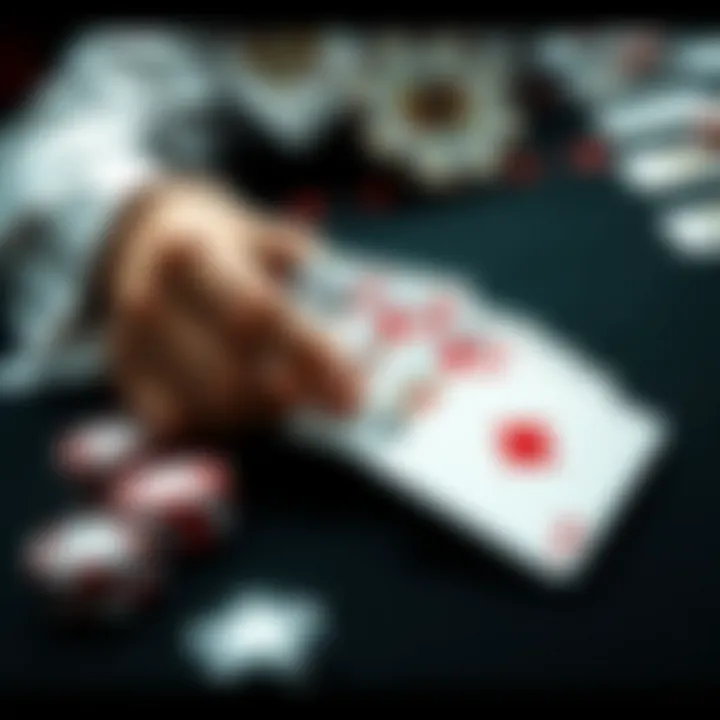
Intro
Blackjack, often referred to as twenty-one, has transcended generations, alluring players with its blend of luck and strategy. It’s a game where the carpet and felt hold stories from the card tables of smoke-filled rooms to sunlit casinos on The Strip. This article aims to serve as a compass for navigating through this intricate game, emphasizing personal strategies and unique insights gleaned from many hours at the table.
Understanding blackjack requires more than knowing the basic rules—it involves comprehending the odds, mastering betting strategies, and adapting through psychological insights. Whether you’re stepping into a casino for the first time or you’re a seasoned player with a few tricks up your sleeve, this examination of blackjack will illuminate how personal experiences can shape your gaming approach.
With myriad strategies at your disposal, this piece will help demystify gameplay while offering pearls of wisdom that could change your fortune. It’s not just about the cards you hold but how you play them—let's delve deeper into the world of blackjack.
Betting Strategies
Strategically placing bets is the backbone of successful gambling. Understanding the odds can significantly influence the decisions you make during gameplay. Not all bets are created equal, and having just a basic grasp of how to manage your bankroll will give you an edge.
Understanding Betting Odds
When stepping up to the felt, one must grasp the betting odds that reflect the true probabilities of winning against the house. Consider it akin to navigating a ship through stormy seas; knowing which way the winds blow can help you avoid dangerous waters.
The dealer's upcard is critical. If you notice they are showing a low card, your odds might be better since they’re more likely to bust. Conversely, if they are showing a ten or an ace, the winds seem to shift, and you must reassess your betting strategy. Adjusting your bets based on these odds allows you to capitalize when the tides are in your favor.
Different Types of Betting Systems
There’s a spectrum of betting systems you might employ, each with its unique flavor. Some popular approaches include:
- Martingale System: A strategy where you double your bet after each loss. If you win, you'll recoup all previous losses plus a profit.
- Paroli System: This one suggests increasing your bet after a win. It’s a positive progression, focusing on capitalizing on winning streaks.
- Fibonacci Betting System: Based on the famous mathematical sequence, this system involves betting amounts that follow the Fibonacci numbers, helping to manage losses strategically.
Adopting a system can create structure in your betting approach, but don’t bet the farm on it; every strategy has its drawbacks and ideal circumstances for effectiveness.
Prologue to Blackjack
Blackjack, often revered as one of the most engaging card games in the world, is more than just a simple wager against a dealer; it’s a rich tapestry interwoven with strategy, psychology, and a keen understanding of numbers. As we unravel its intricacies, it becomes clear why an informed grasp of the game’s origins, rules, and objectives is paramount for any player looking to make their mark at the tables.
Origins of the Game
The genesis of blackjack can be traced back to the 17th century, with roots that intertwine in various cultures. Some historians argue that the French game "Vingt-et-Un,” which means twenty-one, birthed the modern version of blackjack. It was around the turn of the 20th century when the game crossed the Atlantic to the United States, where it gained popularity in casinos. The changing landscapes of gambling legislation shaped its evolution, leading to the familiar rules we know today. It’s curious how this game has morphed across countries and eras, with each culture adding its own twist. For instance, in some European countries, particularly France, the game has retained its classic feel, while in the U.S., variations like Spanish 21 and others have emerged.
The game's name "blackjack" itself stems from a promotion in American gambling establishments. Players could earn a bonus payout for a natural twenty-one consisting of a black jack (the Jack of Spades or Clubs) and an Ace of Spades, further adding an element of glamor to the game. This historical context not only enriches one’s understanding of the game but also allows players to appreciate the strategies that have developed over time.
Rules and Objectives
When stepping onto the blackjack battlefield, understanding the rules is your first line of defense. The fundamental goal is straightforward: beat the dealer’s hand without exceeding twenty-one. Each player begins with two cards, and the dealer also has two, one card face up and one face down. Players can choose to "hit” for additional cards or "stand" with their current total.
There are some key rules to keep in mind:
- Aces can count as one or eleven.
- Face cards are valued at ten.
- All other cards hold their face value.
Players who achieve a total of twenty-one with the first two cards are celebrated for a "blackjack," typically leading to a payout of 3:2.
But it’s not all about luck; strategic choices play a crucial role. Knowledge of the dealer’s face-up card significantly influences decisions. For instance, if the dealer shows a weak card like a five or six, players might choose to stand with a total lower than seventeen, capitalizing on the dealer’s potential bust. Conversely, if the dealer shows a strong card like an Ace, players may have to adopt a more aggressive strategy, often hitting more than usual to try to stay competitive.
Ultimately, the understanding of these rules and objectives lays the foundation upon which all strategies are built. Mastering them is akin to learning the alphabet before penning the next great novel.
"In blackjack, every decision counts—like chapters of a story that lead to a thrilling climax."
By diving into the history and grasping the basic mechanics of the game, players position themselves to develop a deeper comprehension and can begin crafting their individual strategies for success.
Personal Engagement with Blackjack
In the realm of casino games, personal connection can often weigh heavier than mere strategies or statistics. Blackjack, with its rich history and social dynamics, lends itself uniquely to this form of engagement. When players dive into this card game, they quickly realize that beyond the rules and numbers lies a narrative steeped in emotions, memories, and experiences. Understanding one’s journey with blackjack can illuminate the strategies they devise and decisions they make.
This journey isn’t about being just another player at the table; it’s a personal odyssey. Each player brings their own background and perspective into the game, which shapes their approach to it. It’s about learning from your missteps, basking in the thrill of a lucky hand, and even reflecting on those moments of sheer frustration when the cards don’t turn in your favor. Here we’ll delve deeper into the stages of this engagement, starting from that initial brush with blackjack to evolving skill sets that can redefine success at the table.
Initial Encounter
Recollecting the very first brush with blackjack often evokes a kaleidoscope of emotions. It could have been in a bustling casino, perhaps surrounded by the clatter of chips and eager shouts from players, or maybe even in a friendly gathering where stakes were low, but the spirit was high. For many, my own experience echoed a common theme—the thrill of the game paired with the slight intimidation of the unknown.
Perhaps it was the first time seeing the dealer shuffle the cards, and how they seemed to have an almost magnetic sway over the players' fortunes. The atmosphere is infectious, as people huddle around tables, faces alight with hope or crumpled in concentration. This initial encounter can be pivotal; it sets the stage for what might blossom into a lifelong passion or a casual hobby.
Every player remembers the first time they doubled down or even busted out. Did they feel a rush of adrenaline? Was there a sense of camaraderie with fellow players? These early experiences shape one's perception of not just the game, but the social dynamics it engenders. The sheer unpredictability of each hand can turn mere players into eager participants in the unfolding drama of blackjack.
Evolution of Skills
As time marches on, the novice transforms into something more adept. It’s the steady climb of experience that crafts a player’s understanding of blackjack, and this evolution hinges on several factors. Practice, observation, and adaptation are the cornerstones.
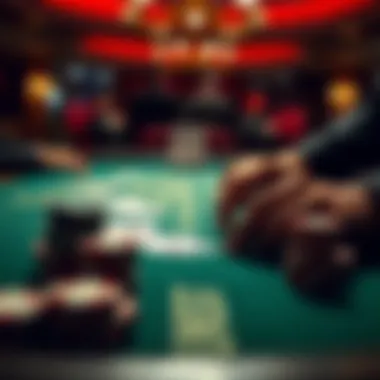
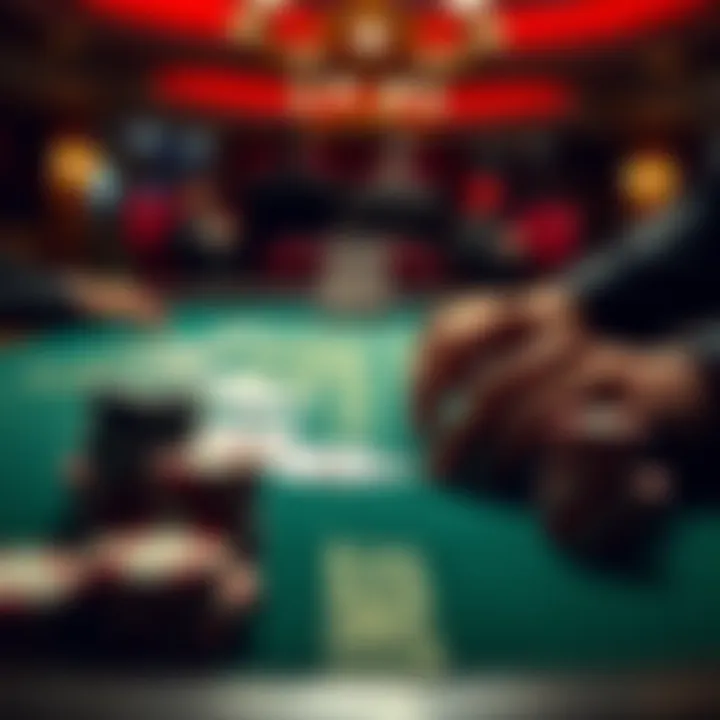
Initial forays often involve a lot of trial and error. Many find themselves adhering to the basic strategies and memorizing the odds but miss the subtleties that separate a good player from a great one. The learning curve can be steep; however, with every miscalculated insurance bet or premature splitting of pairs, lessons are ingrained.
Outdoor home games with friends can provide the perfect breeding ground for skills—players engage in lively banter, share tips, and illuminate strategies over cold drinks. The sheer act of playing for fun fosters a deeper understanding of the game's pace and emotional undertones. Each unique scenario encountered adds layers to the skillset, transforming straightforward card-handling into an art form rooted in decision-making and psychological insight.
For many, it becomes a quest of not only improving numbers but understanding the psychology of gambling. Why did I follow that instinct? or What led me to that choice? These are the questions that spark deeper analytical thinking and hone the skills necessary to become a formidable opponent at the table.
Ultimately, the evolution of skills is a narrative steeped in personal growth and reflection. Every mistake serves as a building block, every win a fleeting high, further entrenched in the player’s memory. This makes the journey through blackjack not just a simple affair of cards, but a complex, involving story of mastery, perseverance, and camaraderie.
"In blackjack, as in life, growth is not linear. Each card dealt is a chance for reflection and improvement."
To further your understanding of blackjack strategies, you might find it useful to visit resources like Wikipedia or Britannica.
Whether you are a seasoned player or just setting foot on the felt, remember that your personal journey in blackjack is just as crucial as the hands you play.
Key Strategies for Success
In the art of blackjack, success isn't just about luck; it entails a mix of informed decisions and calculated plays. Players, both greenhorns and seasoned veterans, must focus on mastering key strategies if they wish to tip the odds in their favor. A well-thought-out approach to the game can greatly enhance one’s chances of walking away with a bigger bankroll.
The strategies discussed in this segment are important because they not only streamline your gameplay but also encourage a disciplined mindset. Grasping these concepts demands an understanding of the mechanics behind the game, risk factors, and even the psychological undertones that can influence your choices at the table. In the following subsections, we will explore essential strategies, including the use of a basic strategy chart and card counting techniques, which serve to demystify the game further.
Basic Strategy Chart
A basic strategy chart is arguably the cornerstone of blackjack play. Operating it can mean the difference between consistent losses and enticing wins. This chart outlines the optimal moves a player can make based on their hand against the dealer's visible card.
By sticking to these strategies, players can effectively minimize the house edge. What makes the basic strategy chart particularly valuable? It’s straightforward and can fit right in your pocket. No more second-guessing your decisions while seated at the felt; just look at the chart, and you have your play!
Card Counting Techniques
Preamble to Card Counting
Diving into card counting, it’s a misunderstood yet powerful method for gaining an edge in blackjack. At its core, this technique keeps track of the ratio of high to low cards left in the deck. While it can sound overly complex, the heart of it all is simple math and a keen eye.
The key characteristic of card counting lies in its ability to shift the odds. Players who can accurately monitor the counts will know when to raise their bets, capitalizing on favorable situations. It’s a worthwhile choice for those seeking to deepen their gameplay. However, missteps can lead to pitfalls. You need practice, focus, and the ability to hide your strategy, as casinos are always on the lookout for anyone trying to outsmart the system.
High-Low System
The High-Low system is one of the more popular counting systems out there. It breaks the cards down into three categories: high cards, low cards, and neutral cards. High cards (10s, face cards, and Aces) are assigned a value of -1, low cards (2-6) a value of +1, and neutral cards (7-9) a value of 0.
Why is this system a compelling option? Its simplicity suits many players, especially when just starting with card counting. It helps quickly assess the deck’s makeup and tweak your betting strategy accordingly. However, a drawback is that “counting” can exhaust you, particularly during lengthy sessions, so keep your focus sharp or risk losing track of the count altogether.
Advanced Techniques
For those who’ve already mastered the basics, advanced techniques might just elevate your game further. These include more elaborate systems, such as Wonging—where you only enter a game when the count is in your favor— and the Rubin system, emphasizing precise bet sizing based on the card count.
The advanced techniques stand out by allowing a much higher level of precision in adjusting your strategy. However, they require serious commitment and practice to truly master. Moreover, some casinos might even recognize these strategies, so it’s important to remain inconspicuous while enjoying your game.
Understanding these strategies can be the linchpin of your blackjack mastery. As you combine the insights gleaned here with practical application, you’ll find yourself not just playing blackjack, but navigating it with a finesse that can set you apart from the crowd.
Managing Risk in Blackjack
Managing risk in blackjack is a crucial aspect of the game that often separates the casual player from the seasoned veteran. Without a careful approach to risk, a player may find themselves at the mercy of the odds, leading to rapid losses or discouragement. Proper risk management allows players to enjoy the game while maintaining the possibility of longevity at the table. Here, we'll break down two key components of risk management: bankroll management and understanding the house edge.
Bankroll Management
One of the first steps in managing risk is establishing a solid bankroll management strategy. Your bankroll is the amount of money you are willing to invest in playing blackjack, and managing this fund wisely can enhance your gaming experience significantly. It involves more than just setting a budget; it’s about understanding how to allocate your funds effectively. Here are some specific points to consider:
- Set a Budget: Before you even sit down at the table, determine how much money you’re willing to put on the line. This establishes a clear boundary and prevents you from chasing losses. Keep it realistic and reflective of your current financial situation.
- Divide Your Funds: Rather than using your entire bankroll in one session, consider dividing it into smaller portions. This forces you to pace yourself and allows for multiple gaming sessions. For example, if your bankroll is $300, it may be practical to consider $50 bets over several sessions rather than risking all of it at once.
- Adjust Your Bet Size: Based on your bankroll, you should also adjust your bet size accordingly. A common approach is to wager 1% to 5% of your total bankroll on any given hand. If your bankroll is $500, this would translate to betting between $5 and $25 per hand. This strategy helps mitigate the risk of significant losses.
- Track Your Spending: Make sure to keep a close eye on your wins and losses. This might feel tedious, but it can provide valuable insights into your playing habits and help you make necessary adjustments in real time.
In addition to these practical approaches, emotional discipline plays a huge role in bankroll management. It’s critical to resist the temptation of playing beyond your set limits, especially during a winning streak or after a tough loss.
Understanding House Edge
At the heart of every casino game lies the concept of the house edge, which is a mathematical advantage that the casino holds over players. Recognizing and understanding this concept is vital for anyone serious about blackjack. The house edge varies by game type and rules, but here are the key takeaways:
- Know Your Game: Not all variations of blackjack are created equal. Depending on the rules, some games may offer better odds. For instance, games that pay 3:2 for a blackjack typically have a lower house edge than those that pay 6:5.
- Basic Strategy: Utilizing a basic strategy chart can significantly reduce the house edge. By following this strategy, players can minimize the advantage the house holds. This involves knowing when to hit, stand, double down, or split based on the dealer’s upcard.
- The Importance of the Rules: Rules such as whether the dealer hits or stands on soft 17 can impact the house edge. Understanding these nuances can give players a strategic edge.
- Expectation vs. Reality: Accept that the house edge ensures it's a long-term loss, no matter how skilled you may get. Understanding this can help maintain a healthier mindset towards winning and losing.
"In blackjack, understanding the house edge is like knowing the terrain before going into battle; it gives you a fighting chance."
By consciously managing both your bankroll and your understanding of the house edge, you position yourself for a more enjoyable and potentially profitable blackjack experience. While unpredictability will always be a part of the game, strategies grounded in sound risk management elevate your play beyond mere luck.
Psychological Aspects of Blackjack
In the world of blackjack, where luck may deal the cards, it's the mind that truly plays the hand. Understanding the psychological aspects of blackjack is essential, not just for enhancing gameplay but also for maintaining a balanced approach to gambling. This section delves into how the mind influences decisions, affects emotional reactions, and shapes the strategic aspects of the game.
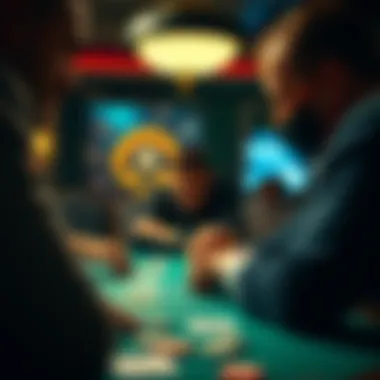
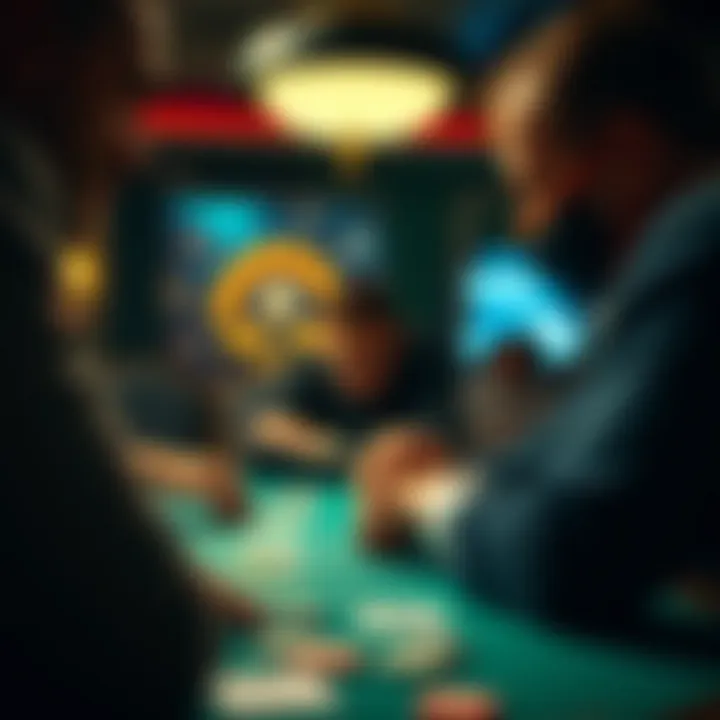
Playing blackjack isn't merely about the cards in front of you; it's also about understanding how your thoughts and feelings can impact your performance. Emotions like excitement, fear, and frustration can dictate betting decisions and risk tolerance. Therefore, having a firm grasp of emotional control and recognizing cognitive biases is crucial for both novices and seasoned players.
Emotional Control
Emotional control in blackjack is the ability to manage one's feelings during play. The stakes can get high, and with high stakes comes high tension. If you're not careful, a rush of adrenaline can lead to hasty decisions, fogging your judgment.
For instance, imagine a player who just hit a winning streak and feels invincible. This euphoric state can tempt the player to increase bets beyond what their bankroll can afford. Eventually, this leads to a phenomenon known as 'chasing losses,' which is when players keep betting in hopes of recovering what they've lost. Consequently, maintaining composure, especially after significant wins or losses, can mean the difference between a successful session and a regrettable one. Here are some techniques that can help in keeping emotions in check:
- Set Limits: Before you sit down to play, decide how much you are willing to lose or win. This limit should be adhered to, no matter what.
- Take Breaks: Step away from the table for a few minutes. It gives you a chance to clear your head and re-evaluate your strategy.
- Stay Grounded: Remember that blackjack is just a game—not a reflection of your self-worth. This mindset helps prevent emotional spirals.
Recognizing Patterns and Biases
Recognizing patterns and biases in blackjack can significantly enhance strategic play. While the game is structured around random events, players often perceive patterns where none exist. This cognitive bias can lead to poor choices based on flawed reasoning.
One common instance is the gambler's fallacy, where players believe that past events can influence future outcomes. For example, if a player notices that the dealer has gone bust several times in a row, they may erroneously believe that the dealer is due for a win. This notion can steer them into reckless betting when logic suggests maintaining a conservative approach.
To counteract these cognitive traps:
- Data Tracking: Keeping a simple journal of your gameplay can help recognize personal patterns in your betting and decision-making.
- Educate Yourself: Understand the odds and probabilities involved. This knowledge can thwart emotional responses that stem from misinterpretation of the game.
- Mindful Observation: Pay attention to your immediate surroundings. Notice how other players react and what tactics they employ, which can inspire more effective strategies for your play.
"A good strategy is not just about calculations; it's about understanding the game and yourself."
In summary, psychological aspects are a cornerstone of blackjack. They encompass emotional control and cognitive biases, which, if not managed properly, can lead to poor choices and financial losses. By mastering these aspects, you can transform your gameplay, turning challenges into opportunities for growth.
Technological Innovations in Blackjack
Technological advancements have significantly reshaped the landscape of blackjack. Over the years, innovations have not only enhanced how players engage with the game but also how they strategize, making it crucial to address this topic in any comprehensive examination of blackjack. The convenience offered by new technology, combined with its impact on gameplay, has led to a more immersive and information-rich experience for enthusiasts.
Among these shifts, the advent of online platforms stands out as a major development. Players can easily access various versions of blackjack from anywhere with a stable internet connection. This has democratized the game, bringing together gamblers from diverse backgrounds and regions, no matter if they are seated in a plush casino or lounging at home. The ease of access to gameplay has led to a surge in popularity, particularly among younger audiences who may find traditional casinos less appealing.
Another significant innovation is the role of Artificial Intelligence. AI's introduction into the blackjack arena has brought forth numerous applications that change the dynamics of the game. Algorithms can analyze betting patterns, suggest strategies, and even assist in training new players. This not only adds a strategic dimension to the player’s experience but also shifts the conventional gameplay towards something more data-driven and analytical.
"With the continuous evolution of technology, it’s almost as if blackjack itself is adapting, finding new ways to captivate and challenge players."
In this section, we dive deeper into two crucial aspects of technological innovations in blackjack: online platforms and variations and the role of artificial intelligence.
Online Platforms and Variations
The online blackjack scene has burgeoned, featuring numerous platforms dedicated to delivering varied gaming experiences. Websites like 888casino, Betfair, and William Hill provide a plethora of blackjack variants, from classic games to modern adaptations with unique rules. These formats cater to all levels of expertise; whether you are just learning the ropes or looking for something to test your skills, there's something for everyone.
Moreover, the development of mobile applications has made it possible to play blackjack on-the-go. The proliferation of smartphone capabilities has led to a rise in mobile-friendly platforms, allowing players to engage with the game at their convenience while also enjoying smooth gameplay. The graphical enhancements offered in these apps add to the experience, making it visually appealing and engaging.
Types of Online Variations include:
- Classic Blackjack: The traditional format players know and love.
- European Blackjack: This variant employs a single deck and allows for different rules regarding splits and double downs.
- Progressive Blackjack: Offers a jackpot that grows with each bet, offering incentivizing opportunities for players.
Role of Artificial Intelligence
Artificial Intelligence has fundamentally changed how players approach blackjack strategies. By leveraging AI technology, many platforms can offer real-time analytics, helping players assess their performance and adjust strategies on-the-fly. For example, advanced AI can recognize trends in a player's betting pattern and prompt changes that might optimize their outcomes.
Additionally, some online casinos provide AI-powered dealers in live blackjack games. Players can interact with these dealers as they would in a physical casino, offering a more immersive experience while still reaping the benefits of technology. The growing adaptability of AI continues to reshape gaming knowledge, providing education tools that better equip players to face both human and machine opponents.
In summary, technological innovations in blackjack have brought the game to a new audience, enhanced its appeal, and changed how strategies are formed and executed. With the ongoing evolution in this space, players can only expect more interesting developments that may shape their future experience with blackjack.
Cultural Influences on Blackjack
Blackjack, a game steeped in history, translates various cultural frameworks into its play style and social dynamics. This section elucidates the pivotal role of culture in shaping how blackjack is experienced across the globe. In various regions, cultural norms dictate not only the game’s rules but also the social interactions and even the gambling ethos. Recognizing these differences enriches one’s understanding and appreciation of the game.
Global Variations of the Game
From the vibrant casinos in Las Vegas to the chic gambling halls of Monte Carlo, blackjack has adapted to varied cultural backdrops. Each locale brings its own twist, reflecting the local customs and the preferences of the players. For instance:
- European Blackjack: Traditionally played with one deck, European blackjack is known for its rule that the dealer only receives one card face up initially. The strategic implications of this make it distinct, as players must carefully consider their decisions without knowing the dealer's second card.
- Spanish 21: A variation popularized in Latin America, Spanish 21 removes the tens from the deck. This seemingly small change significantly alters strategies, pushing players to adapt their approach to counting cards and evaluating risk.
- Blackjack Switch: In this variation, players are dealt two hands and have the option to switch the second cards between them. The cultural proclivity for innovation keeps the game fresh and exciting, adding layers of strategy to an already complex game.
Exploring these variations not only unravels different strategies that emerge but also provides insights into how various cultures influence gameplay style and sociability at the table. The game becomes a melting pot of influences, carrying echoes of local history and communal interaction along with each hand dealt.
Impact of Media on Perceptions
The portrayal of blackjack in films, television, and literature has been nothing short of transformative, impacting how the game is perceived across different cultures. Icons such as James Bond have depicted blackjack as not just a game of chance but a battleground for cunning and psychological warfare.
Moreover, televised tournaments have shifted public perception from a mere gambling activity to a respected skill-based competition. For example:


- Documentaries and Shows: Programs that delve into strategies of professional players have opened the doorway for newbies to appreciate the depth of the game, emphasizing skill, intellect, and strategy over luck.
- Social Media Influence: Platforms like Reddit have catalyzed discussions that shape understanding and approach. Players share tips, strategies, and anecdotes, building a community that shares a common love for the game. The growth of influencer culture in the gambling space has also contributed, as followers align themselves with specific strategies or narratives that resonate.
Ultimately, media serves as a powerful lens that distorts or clarifies the reality of blackjack, fostering a holistic understanding that transcends geographical boundaries. The game is not just about winning or losing; it’s wrapped in a larger narrative stitched across cultures and stories.
Ethical Considerations in Blackjack
The world of blackjack, while thrilling and layered with strategy, also presents an array of ethical dilemmas that every player must navigate. The discussions surrounding these ethical considerations are crucial, as they can significantly influence not just personal gameplay but the broader gambling environment. Players must grapple with balancing the thrill of strategy against the potential morality of their actions.
Understanding the importance of ethics in blackjack can lead to a more enriching gaming experience. It develops a framework in which skills can be honed without crossing into dubious territory.
The Line Between Strategy and Cheating
In blackjack, the line between permissible strategy and outright cheating can sometimes seem razor-thin. Strategies like card counting are widely accepted, regarded more as a skill than any form of deception. However, this practice indeed raises questions about fairness.
- Card Counting: This technique involves keeping track of the ratio of high to low cards remaining in the deck. While it's legitimate to put your skills to the test, many casinos take umbrage at this, interpreting it as a threat to their bottom line.
- Collusion: Partnering up with another player to share information or signal each other is where ethics take a steep dive into darker waters. Such actions can ruin the experience for others and reflect a lack of sportsmanship.
- Use of Technology: Employing devices or software to gain an edge can classify you as a cheat. This goes beyond the realm of strategy, infringing on the core principles of fair play that the game embodies.
To quote a common saying: "All is fair in love and war," but in blackjack, it’s crucial to define where that fairness begins and ends. Engaging in practices that diminish others' chances undermines the game, diluting its allure.
Responsible Gambling Practices
Taking a responsible approach to gambling is paramount. While blackjack can undoubtedly be a source of excitement and enjoyment, it also harbors risks that demand awareness and thoughtful consideration.
- Setting Limits: Establish boundaries for betting and time commitments before you even sit down at the table. Determining what you can afford to lose is both wise and ethical, ensuring the game remains fun rather than a source of stress.
- Recognizing Problem Gambling: Stay attuned to signs of compulsive behavior. If playing stops being enjoyable and becomes a compulsion, it's critical to reassess your involvement with the game. Programs and resources are available to help those struggling with gambling addiction.
- Maintaining Transparency: Whether you’re playing at a physical casino or online, it’s essential to operate transparently. This means adhering to the house rules and being forthcoming about your strategies and intentions, fostering goodwill in the gaming community.
In essence, the heart of responsible gambling lies in understanding your limits and respecting the nature of the game itself. By cultivating an environment of fairness, one can enjoy blackjack while elevating the experience for fellow players.
For more insights on responsible gambling, you might find these resources useful:
By considering these ethical aspects, players can forge a personal relationship with blackjack that is not only fun and engaging but also rooted in integrity.
Future Trends in Blackjack
As we forge ahead in the evolving landscape of gambling, understanding future trends in blackjack is pivotal. Both players and industry stakeholders need to keep an eye on significant changes that could affect strategies, mechanics, and the overall gaming experience. Trends in technology and consumer behavior are carving a path for new playing conditions, shaping how the game is enjoyed in various environments—from traditional casinos to online platforms.
Emerging Strategies
In the world of blackjack, emerging strategies are becoming more relevant than ever. With players seeking an edge, many are blending traditional tactics with innovative approaches. For instance, a growing number of players are experimenting with hybrid strategies that incorporate elements from various gambling systems. Some are combining aspects of card counting with betting systems like the Martingale or Paroli system, aiming to capitalize on winning streaks while managing losses.
The trend of utilizing technology to enhance gameplay is also gaining traction. Mobile apps are making it easier for players to track their hands and strategize in real time, even when playing online. Moreover, live dealer games are becoming more popular, offering a chance to engage with the game just like in a physical casino but from the comfort of home.
Benefits of these Emerging Strategies
- Increased Player Engagement: By adapting traditional strategies, players can enhance their enjoyment and actively participate rather than simply relying on luck.
- Skill Development: Emerging strategies promote critical thinking and game analysis, which can lead players to refine their skills further.
- Flexibility: Players can tailor strategies to fit their personal style and comfort level, enabling a more customized gaming experience.
The Growing Role of Analytics
The utilization of analytics in blackjack is a trend that's gaining momentum. Today, more players are leveraging data-driven insights to inform their decisions at the table. From examining past hands to predicting possible outcomes, the emphasis on statistical analysis is transforming how players approach the game.
Artificial intelligence tools are also making their mark, analyzing vast amounts of data to identify patterns that may be overlooked by the human eye. AI, combined with machine learning, can predict outcomes, helping players make educated moves. This level of analysis brings a new layer of sophistication to the table that can enhance one’s strategic edge.
Considerations for the Future
- Data Privacy: The increasing reliance on analytics raises concerns regarding data privacy and how personal gaming habits are tracked and used.
- Accessibility: While analytics can elevate gameplay, they may also create a divide between casual players and those willing to invest in technology and training.
- Evolution of Strategies: As more players tap into data analytics, traditional methods may need to evolve, keeping the competition fresh and compelling.
“The intersection of technology and blackjack is not just a phase; it’s redefining the game for better or worse.”
Players, marketers, and analysts must stay vigilant about these future trends. As blackjack continues to adapt and change, detailed knowledge of these trends will equip stakeholders with the tools necessary for success in this ever-evolving domain.
Closure
The conclusion serves as the final stepping stone toward a seasoned understanding of blackjack. It's not just a neat wrap-up of strategies and insights; it crystallizes the essence of what has been traversed throughout this exploration. From personal experiences to strategic depth, the journey through blackjack is as layered as the game itself.
Reflecting on Personal Experiences
As I sit back and reflect on my journey with blackjack, I can’t help but notice how each hand dealt has shaped my approach to the game. It’s true what they say: experience is the best teacher. I remember my first thrilling win, where every card flipped seemed to dance in my favor. However, that original flush of excitement was soon dimmed by losses that felt like boot camp—you get knocked down to learn to stand up stronger.
I’ve come to understand that every player has a unique tale to tell. Some are drawn to the flash of success while others revel in the calculated thrill of strategy. Personal anecdotes often underscore the emotional connections made within the game. For example, faced with a tough decision to hit or stand can turn into a miniature life lesson, emphasizing patience, foresight, and sometimes—calculating the risks at stake. It teaches you more about yourself than you might initially expect.
Final Thoughts on Mastery
Reaching mastery in blackjack is akin to sculpting; it takes time, practice, and the willingness to adapt. The insights gained from numerous games and countless hours of strategizing contribute more than just winning; they cultivate a deeper appreciation for the intricacies of decision-making. In the realm of gambling, mastery doesn't simply come from knowing the rules, but from engaging with the psychology behind each move.
Important Considerations for Mastery:
- Continuous Learning: The landscape of blackjack continually evolves. Keeping abreast with new techniques can prevent stagnation.
- Mental Fortitude: Maintaining composure under pressure is vital. Developing emotional control can often make or break a game.
- Community Insight: Engaging with fellow players can expose you to fresh perspectives and strategies, much like a book club for strategists.
By synthesizing personal experience with strategic theory, you not only improve your gameplay but also enhance your understanding of the larger tapestry that is blackjack. It's an appreciation that transcends mere numbers and cards; it becomes a journey of personal growth and mastery.







